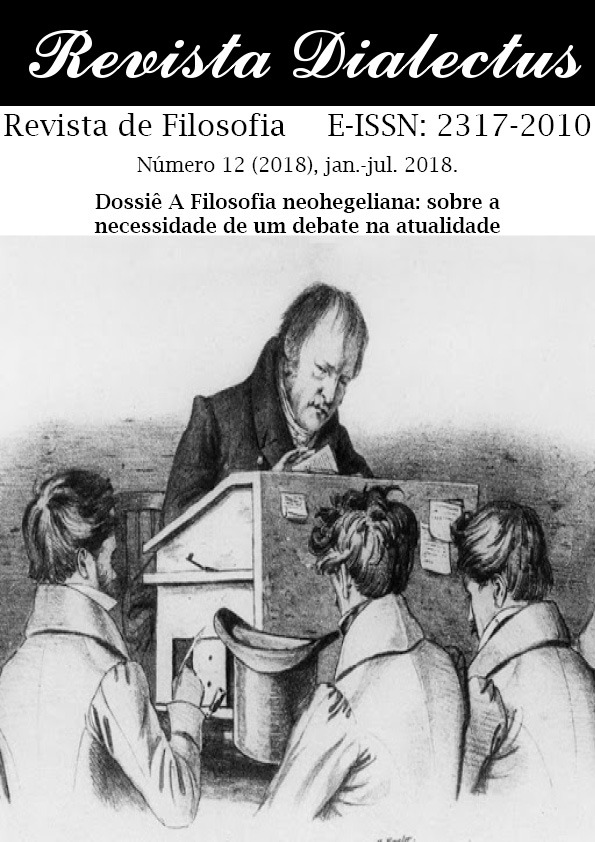A INFLUÊNCIA HEGELIANA DO RECONHECIMENTO EM CHARLES TAYLOR E AXEL HONNET NA CONTEMPORANEIDADE
DOI:
https://doi.org/10.30611/2018n12id33219Keywords:
Reconhecimento. Intersubjetividade. Liberdade.Abstract
O presente artigo pretende analisar a categoria reconhecimento nas filosofias de Charles Taylor e Axel Honneth. O tema em questão apresenta relevância na contemporaneidade pelo fato da existência de grupos sociais, entidades ditas minoritárias que desejam mais espaços públicos de discussão a fim de terem seus direitos reconhecidos, efetivados. Nesse sentido, faz-se necessário inserir na discussão dois autores atuais que tratam do assunto reconhecimento em seus sistemas filosóficos. Não por acaso que o fio condutor adotado neste escrito são os escritos juvenis de Hegel em Iena. Isso porque a filosofia deste autor alemão traz a intersubjetividade como elemento central na presente discussão. Dito de outro modo, a construção especulativa desta mediação propicia a efetivação da ideia de liberdade e, consequentemente, a possível concretização da ideia de vida ética comunitária. Nesse ponto, os autores contemporâneos se aproximam no que tange a essa tentativa de analisar as mediações desse tipo de reconhecimento para a sociedade atual. Ainda assim, os mesmos possuem algumas diferenças que a presente argumentação pretende desenvolver.References
ARAÚJO NETO, J.A.C. A categoria reconhecimento em Axel Honneth. In: Argumentos. Ano:3, n.5, 2011, p. 139-147.
BAVAGNANI, H.B. Luta por reconhecimento: a filosofia social do jovem Hegel segundo Honneth. Kinesis, v.1, n.1, mar. 2009, p.39-57.
BRANDÃO, M.G. Hegel: o estado como realização histórica da liberdade. In: WELLFORT, F. C. (Org.). Os clássicos da política. São Paulo: Ática, 2006. 11. ed.
FRASER, N. From distribution to recognition? dilemmas of justice in a „postsocialist‟ Age. In:_____. Justice Interruptus – critical reflections on the „postsocialist‟ condition. London: Routledge, 1997.
HEGEL, G.W.F. O sistema da vida ética. Tradução de Artur Morão. Lisboa: Edições 70, 1991.
_____. Sobre as maneiras científicas de tratar o direito natural. Tradução de Agemir Bavaresco e Sérgio B.Christino. São Paulo: Loyola, 2007.
HOBBES, T. Leviatã ou matéria, forma e poder de um Estado eclesiástico e civil. Tradução de João Paulo Monteiro e Maria Nizza da Silva. São Paulo: Abril Cultural, 1974. (Coleção Os Pensadores, XVI).
FRASER, N; HONNETH, A. Reditribution or recognition?: a political philosophical exchange. London: Verso, 2003.
FRASER, N. Recognition without ethics? Theory, Culture & Society. Londres/New Delhi, Thousand Oaks, v. 18, n. 2-3, p. 21-42, 2001.
HONNETH, A. Luta por reconhecimento: a gramática moral dos conflitos sociais. Tradução de Luis Repa. São Paulo: Ed.34, 2003.
_______. Patologias da Liberdade individual. O diagnóstico hegeliano da época e o presente. Tradução Luis Repa. Novos Estudos CEBRAP, n. 66 jul/2003, p. 77-90.
MATTOS, P. A Sociologia política do reconhecimento: as contribuições de Charles Taylor, Axel Honneth e Nancy Fraser. São Paulo: Annablumme, 2006.
MEAD, Georg H. Espiritu, persona y sociedad. México: Paidós, 1983.
RICOEUR, P. Percurso do reconhecimento. São Paulo: Loyola, 2006.
MORAIS, Alexander Almeida A concepção de Charles Taylor de uma ética da autenticidade unida a uma política do reconhecimento. In: Revista Filosofia Capital. Vol.6. Edição 13, 2011, p. 3-10.
TAYLOR, C. As fontes do self. São Paulo: Loyola, 1997, p. 9-145.
________. The politics of recognition. In: GUTMANN, A (Ed). Multiculturalism: examining the politcs of recognition. Princeton: Princeton University Press, 1994, p. 25-73.
_______. Argumentos filosóficos. Ed. Loyola, 2000.
WINNICOTT, D. A família e o desenvolvimento individual. Tradução de Marcelo Brandão Cipola. São Paulo: Martins Fontes, 1983.
_______. Da pediatria à psicanálise. Tradução de Davy Litman Bogomoletz. Rio de Janeiro: Imago, 2000.
Downloads
Published
Issue
Section
License
Authors who publish in this journal agree to the following terms:
- Authors retain the copyright and grant the journal the right of first publication, with the work simultaneously licensed under the Attribution-NonCommercial-NoDerivatives 4.0 International (CC BY-NC-ND 4.0) License, which allows the non-commercial sharing of work, without modifications and with acknowledgment of authorship and initial publication in this journal.
- Authors are authorized to take additional contracts separately, for non-exclusive distribution of the version of the work published in this journal (eg publish in institutional repository or as a book chapter), with acknowledgment of authorship and initial publication in this journal.
- Authors are allowed and encouraged to publish and distribute their work online (eg in institutional repositories or on their personal page) at any point before or during the editorial process, as this can generate productive changes as well as increase the impact and citation of published work (See The Free Access Effect).



















